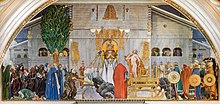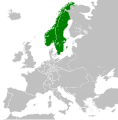Welcome to the Sweden Portal! | |||||||||

|

|

| |
Sweden, formally the Kingdom of Sweden, is a Nordic country located on the Scandinavian Peninsula in Northern Europe. It borders Norway to the west and north, Finland to the east, and is connected to Denmark in the southwest by a bridge–tunnel across the Öresund.
At 450,295 square kilometres (173,860 sq mi), Sweden is the largest Nordic country and the fifth-largest country in Europe. The capital and largest city is Stockholm. Sweden has a population of 10.5 million, and a low population density of 25.5 inhabitants per square kilometre (66/sq mi), with around 87% of Swedes residing in urban areas, which cover 1.5% of the entire land area, in the central and southern half of the country. Nature in Sweden is dominated by forests and many lakes, including some of the largest in Europe. Many long rivers run from the Scandes range, primarily emptying into the northern tributaries of the Baltic Sea. It has an extensive coastline and most of the population lives near a major body of water. With the country ranging from 55°N to 69°N, the climate of Sweden is diverse due to the length of the country.
Germanic peoples have inhabited Sweden since prehistoric times, emerging into history as the Geats (Swedish: Götar) and Swedes (Svear) and constituting the sea peoples known as the Norsemen. A unified Swedish state emerged during the late 10th century. In 1397, Sweden joined Norway and Denmark to form the Scandinavian Kalmar Union, which Sweden left in 1523. When Sweden became involved in the Thirty Years' War on the Protestant side, an expansion of its territories began, forming the Swedish Empire, which remained one of the great powers of Europe until the early 18th century. During this era Sweden controlled much of the Baltic Sea. (Full article...)

Midvinterblot (Swedish for "Midwinter sacrifice") is a painting by the Swedish painter Carl Larsson, created in 1915 for the hall of the central staircase in Nationalmuseum in Stockholm. It has been called Sweden's most controversial painting.
The painting depicts a legend from Norse mythology in which the Swedish king Domalde is sacrificed to avert famine. After long debate, the painting was rejected by the museum; but the controversy resurfaced in the late 20th century, and the painting finally was placed where Carl Larsson had intended. (Full article...)Selected article -
The Scanian War (Danish: Skånske Krig; Norwegian: Den skånske krig; Swedish: Skånska kriget; German: Schonischer Krieg) was a part of the Northern Wars involving the union of Denmark–Norway, Brandenburg and Sweden. It was fought from 1675 to 1679 mainly on Scanian soil, in the former Danish–Norwegian provinces along the border with Sweden, and in Northern Germany. While the latter battles are regarded as a theater of the Scanian war in English, Danish, Norwegian and Swedish historiography, they are seen as a separate war in German historiography, called the Swedish-Brandenburgian War (German: Schwedisch-Brandenburgischer Krieg).
The war was prompted by Swedish involvement in the Franco-Dutch War. Sweden had allied with France against several European countries. The United Provinces, under attack by France, sought support from Denmark–Norway. After some hesitation, King Christian V started the invasion of Skåneland (Scania, Halland, Blekinge, and sometimes also Bornholm) in 1675, while the Swedish were occupied with a war against Brandenburg. The invasion of Scania was combined with a simultaneous Norwegian front called the Gyldenløve War, forcing the defending Swedes to fight a two-front war in addition to their entanglements in the Holy Roman Empire. (Full article...)Did you know -

- ... that Sweden was a major power in Europe during the 17th century?
- ... that the first public Swedish orienteering competition, held in 1901, had two churches, Spånga and Bromma kyrka (pictured) as control points?
- ... that Gustav Rosén sent apples from northern Sweden to newspaper editors in the south to show that grass was not the only thing that grew "up there"?
General images -
Idrottsföreningen Kamraterna Göteborg (officially IFK Göteborg Fotboll), commonly known as IFK Göteborg, IFK (especially locally) or simply Göteborg, is a Swedish professional football club based in Gothenburg. Founded in 1904, it is the only club in the Nordic countries that has won one of the main UEFA competitions, having won the UEFA Cup in both 1982 and 1987. IFK is affiliated with Göteborgs Fotbollförbund and play their home games at Gamla Ullevi. The club colours are blue and white, colours shared both with the sports society which the club originated from, Idrottsföreningen Kamraterna, and with the coat of arms of the city of Gothenburg. The team colours have influenced the historical nickname Blåvitt. The blue and white are in stripes, with blue shorts and socks.
Besides the two UEFA Cup titles, IFK have won 18 Swedish championship titles, second most in Swedish football after Malmö FF, and have the second most national cup titles with eight. The team has qualified for four group stages of the UEFA Champions League, and reached the semi-finals of the 1985–86 European Cup. IFK Göteborg is the only club team in any sport to have won the Jerring Award, an award for best Swedish sports performance of the year voted by the Swedish people, for the 1982 UEFA Cup victory. (Full article...)Categories
Main topics
Subdivisions: Counties of Sweden • Municipalities of Sweden • Provinces of Sweden

History: 1975 Occupation of the West German embassy • Ådalen shootings • Consolidation of Sweden • Early Swedish history • Enlightened Absolute Monarchy in Sweden • Early Vasa era • Industrialization of Sweden • Post-war Sweden • Prehistoric Sweden • Rise of Sweden as a Great Power • Suiones • Swedish Empire • Sweden after the Great Northern War • Sweden and the Winter War • Sweden during late 19th century • Sweden during World War II • Swedish allotment system • Swedish emigration to the United States • Union between Sweden and Norway
Politics: Alliance for Sweden • Constitution of Sweden • Foreign relations of Sweden • Government of Sweden • Parliament of Sweden • Riksdag • Swedish general election, 2006 • Swedish general election, 2010 • Swedish neutrality • Swedish welfare
Demographics: Education • Ethnic minorities • Languages • Religion • Subdivisions • Cities • People • Healthcare • Immigration
Culture: Cinema of Sweden • Cuisine of Sweden • Music of Sweden • Sports in Sweden • Swedish literature • Tourism in Sweden
Symbols: Flag • Coat of arms • National anthem
Things you can do
 |
Here are some tasks awaiting attention:
|
Wikipedia in Swedish
 |
There is a Swedish version of Wikipedia, the free encyclopedia. |
 |
WikiProjects
Featured and good content
Related portals
Northern Europe
Other countries








































